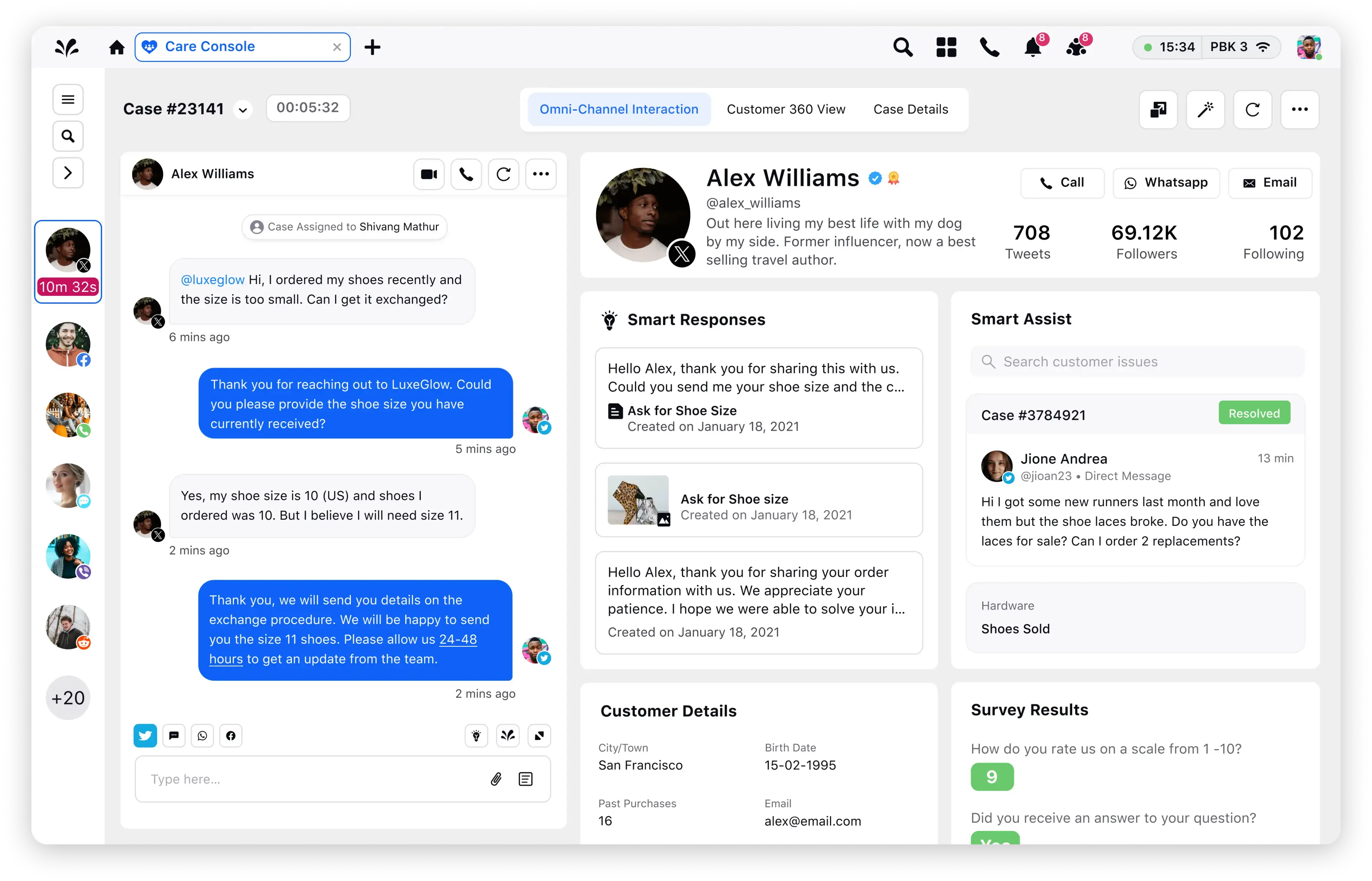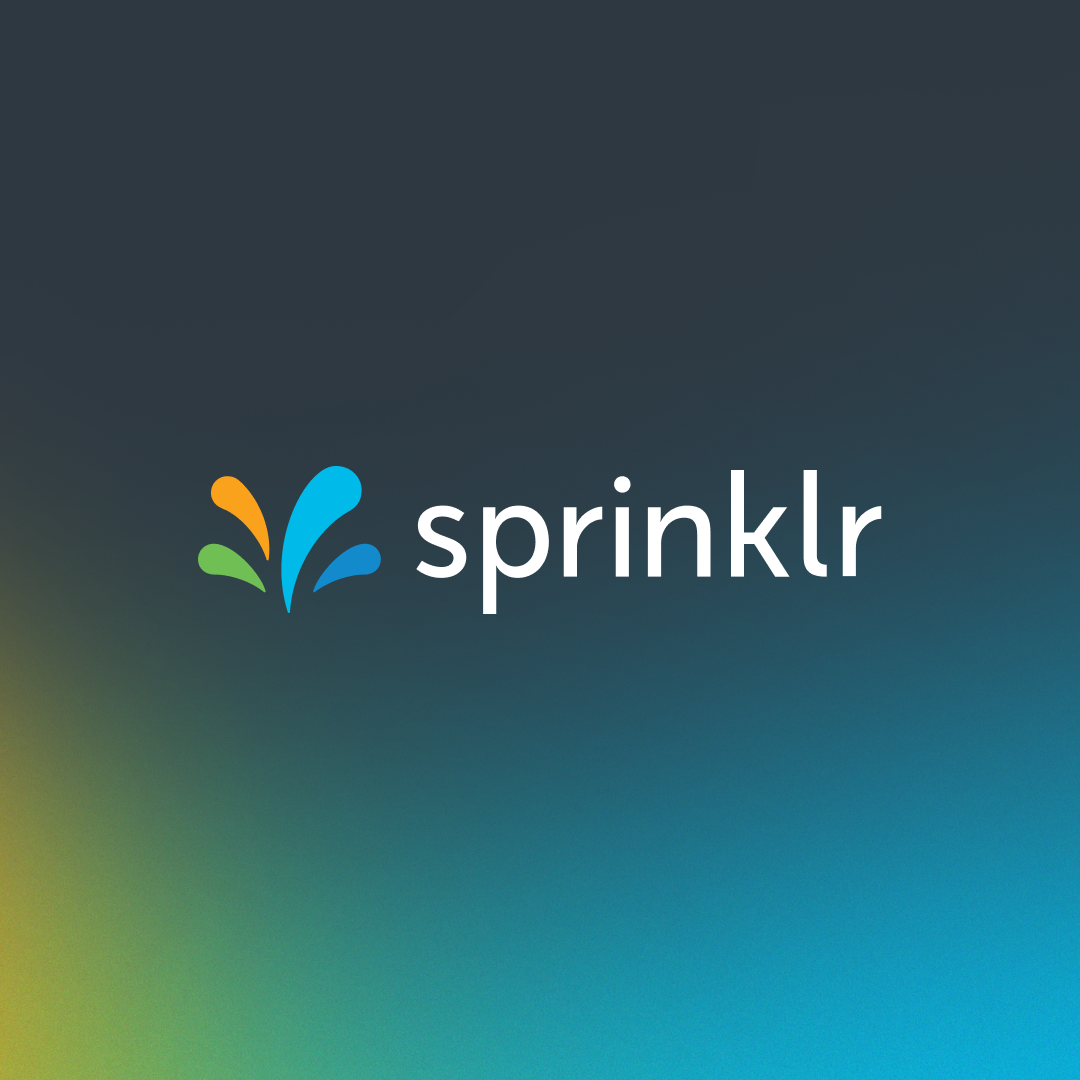The next generation of CCaaS is here
Digital-first customer service, enterprise-scale voice support. Redefine customer service with an AI-powered platform that unifies voice, digital and social channels. Power channel-less interactions and seamless resolution no matter the channel of contact.

Customer Service in Education Industry: Process + Benefits
Imagine Alex, a prospective student, struggling with university admissions. Emma, a top-notch admission rep, answers his questions, provides tailored advice and resolves issues quickly. Her exceptional support turns Alex’s interest into a commitment to enroll, showcasing how crucial customer service is in shaping a positive educational journey.
However, effective customer service in education extends beyond mere problem-solving. It plays an important role in streamlining online student-teacher interactions and addressing the evolving needs of students, parents and faculty. Institutions prioritizing customer service improve stakeholder satisfaction levels, gaining a competitive edge through increased student enrollment and higher retention rates.
In this blog, you will learn about the significance of customer service in the education sector, its benefits and strategies for implementing top-notch customer service.
Role of customer service in the education industry
Customer service in the education industry refers to the comprehensive support and assistance provided to students, parents, teachers and staff to enhance their overall experience with their school or university. This support includes a range of activities such as helping students navigate online learning platforms, resolving technical issues and answering inquiries about admissions, financial aid and course offerings. Additionally, it extends to supporting parents with enrollment processes and academic updates.
In the technology-driven environment, educational institutions are increasingly recognizing the importance of personalized communication and omnichannel customer service. Leveraging technological advancements like AI-powered toolkits and chatbots enables institutions to streamline interactions and provide timely, relevant support across multiple communication channels.
This approach fosters a more accessible, efficient and supportive learning environment, benefiting all stakeholders and contributing to a positive academic experience.
Essential components of customer service in the education industry
Exceptional customer service in the education industry can enhance your institution's reputation and strengthen student relations. Key elements for building strong relationships with students, parents and faculty include:
1. Accurate information sharing
At the heart of excellent customer service in the education industry lies the commitment to clear, consistent communication. By understanding and respecting stakeholders' expectations, you can cultivate a trustworthy environment that supports positive educational experiences.
For example, look at the University of Michigan-Dearborn. The institution promotes a culture of respect on campus by offering academic advising services. The goal? Support students in exploring their personal and professional goals.
2. Promoting openness and transparency
Building trust with students is essential for a positive educational experience. Open and honest communication about policies, processes and goals is crucial. Actively seeking feedback and addressing concerns transparently demonstrates your institution's commitment to accountability and partnership.
3. Being encouraging and accepting
A supportive and inclusive learning environment is essential for student success. The school or university should acknowledge students’ efforts and push them to reach their full potential. They must feel respected and valued for their identities and experiences. The institution must promote a positive and equitable atmosphere to help students reach their full potential.
Cornell University’s LGBTQ+ Resource Center showcases acceptance and encouragement by supporting and hosting events that celebrate diversity.
Benefits of customer service in the education industry
Customer service in the education industry plays a pivotal role in creating a positive and efficient learning environment for students. Some of the key benefits are as follows:
1. Increases retention rate
Effective customer service in educational institutions can help improve retention rates. By providing prompt and helpful support, institutions can quickly address students' concerns and needs.
Consider Georgia State University. The institute used predictive analytics to identify the students at risk of dropping out and provided timely advice. As a result, partner schools saw an average 6.7 percentage point increase in the first-year retention rate from fall 2022 to fall 2023.
2. Improves loyalty
Customer service excellence in education significantly improves loyalty among students and parents. This loyalty translates into long-term relationships, where students are more likely to pursue further education or recommend the institution to others. This leads to better retention and higher graduation rates in educational institutions.
For instance, take Harvard University. It has a well-knit alumni network. Harvard’s alumni program fosters a sense of community and engagement long after students leave campus. This helps the university maintain relationships with alumni, who reciprocate through donations, mentorship and brand advocacy.
3. Supports problem resolution
Efficient problem resolution is a cornerstone of exemplary customer service in any industry. Quick and effective responses to technical difficulties, administrative questions or academic concerns can prevent minor problems from escalating into major disruptions.
Efficiency saves time and resources and enhances the overall satisfaction of students and staff. When problems are resolved swiftly, it creates a smoother educational experience, allowing students to focus on their studies and staff to concentrate on their duties.
4. Increases referrals
Satisfied students, parents and staff are likelier to share their positive experiences with friends, family and colleagues. This creates a positive brand reputation for the institution, thereby driving enrollment growth through personal endorsements.
Arizona State University (ASU) treats its students as social media ambassadors. Students share their personal experiences from campus life on different social media channels. These posts act as social proof and encourage prospective students to connect with the university, increasing referrals.
5. Builds reputation
A strong reputation for support and care attracts prospective students, talented staff and faculty members. Institutions renowned for their exceptional service are seen as trustworthy and committed to student success.
For example, Duke University’s tech support hubs provide round-the-clock technical support to students and staff so they can continuously access essential resource materials. Such service delivery models help establish a distinguished brand in the education sector.
6. Lends competitive advantage
In an industry where many schools offer similar academic programs, outstanding customer service can distinguish your institution from the competition. This helps attract and retain students who prioritize supportive and responsive environments.
Take Southern New Hampshire University (SNHU) as an example. It has consistently invested in personalized support for its students, particularly within its online education programs. By offering excellent customer service, the institute distinguishes itself from other universities.
How to implement good customer service in the education industry
Implementing good customer service in any industry requires a detail-oriented approach. In the education sector, institutes need a comprehensive strategy that defines clear goals and identifies critical service areas, such as admissions, student services, parent communication, etc.
Let's dive into these strategies that can enhance customer service for educational institutions:
1. Implement personalization
Personalization in the education sector can be implemented across various touchpoints by leveraging data, technology and human-centered approaches. Here are a few key strategies to build effective personalization:
- Data-driven insights: By collecting data from student interactions, academic performance and feedback, you can proactively create individualized learning plans, identify at-risk students and address their concerns, fostering a sense of responsibility and care.
- Personalized communication: Communication plays a vital role in creating customized experiences. You can use CRM platforms to send targeted emails, SMS alerts or app notifications based on individual preferences and needs.
For instance, prospective students can receive tailored messages regarding admission deadlines, scholarship opportunities or relevant academic programs that align with their interests. - Customized learning paths: Personalization can also extend to academics through adaptive learning technologies that adjust curriculum content based on each student's learning pace and style. You can deploy learning management systems (LMS) integrated with AI-driven tools to create dynamic, student-specific learning experiences. For example, AI algorithms can assess students' grasp of specific subjects and recommend additional resources, tutoring sessions or coursework that align with their academic needs.
📚Must Read: How to deliver personalized customer service
2. Adopt an omnichannel approach
Much like other industries, the education sector is undergoing a digital transformation. With the rise of online courses, remote learning and digital admissions processes, students and parents now prefer different communication methods depending on their comfort level, location and the issue's complexity.
For example, international students prefer email or live chat to ask questions about visa documentation, while domestic students may feel more comfortable calling the admissions office directly. An omnichannel strategy ensures that all students receive the same high-quality, efficient support, regardless of their chosen channel.
💡 Pro tip: Implement a digital customer service platform that combines all support channels into one unified dashboard. This lets your support team maintain a 360-degree view of previous interactions, ensuring continuity and context. Whether students reach out via phone calls, chat or email, omnichannel routing ensures agents can seamlessly switch between channels while maintaining the flow of conversation.
📌 Important to Remember
When implementing a customer service platform, it's crucial to prioritize protecting student data, such as personal information, academic records, behavioral data and financial information. To safeguard sensitive student information, ensure your platform complies with relevant data protection regulations and standards, such as FERPA (Family Educational Rights and Privacy Act) and COPPA (Children's Online Privacy Protection Act).
COPPA and FERPA are federal laws in the US. They protect sensitive personal information to ensure privacy. FERPA applies to all educational institutions, while COPPA applies to online operators who manage the personal data of children under 13 years of age.
3. Accelerate first response times
Rapid initial responses to inquiries and issues demonstrate that the institution values its stakeholders and is committed to addressing their needs promptly. You can achieve faster first response times (FRT) with advanced tools like AI-powered chatbots to handle routine inquiries like admissions, course offerings and fee structures.
This allows your staff to handle more complex issues requiring expert attention, such as scholarship approvals, grievance processes or crisis management.
4. Deliver 24/7 support
Round-the-clock assistance ensures that students, parents and staff can access help whenever needed, regardless of time zones or schedules. This availability is important for online learners and international students who may require support outside traditional office hours. It improves both student satisfaction and experience.
💡Deliver 24/7 support with Sprinklr AI+-powered multilingual chatbots
With Sprinklr’s conversational AI platform, you can build and deploy AI-powered chatbots across 25+ channels (including voice) in 100+ languages. The platform’s intuitive drag-and-drop UI simplifies discovery, building, testing, deployment and KPI measurement.
The standout feature of Sprinklr’s AI+-powered bots is their ability to dynamically handle requests and resume conversations seamlessly, even after interruptions. This ensures a human-like experience, driving higher engagement and satisfaction.


5. Monitor key metrics
Exceptional service comes from frequently monitoring the key metrics and re-evaluating the goals that deliver customer satisfaction. Track metrics such as resolution time, first contact resolution (FCR) rate and student satisfaction score. Evaluating these metrics can provide valuable insights into your service performance.
6. Gather feedback and reviews
Gathering feedback and reviews is essential for improving customer service. You can seek input from students, parents and staff through customer surveys, suggestion boxes and review platforms and gain valuable insights into your strengths and identify areas needing improvement.
For instance, you can identify students struggling with a particular course. Based on feedback, you can provide additional resources to the struggling students to improve their performance. Effective feedback management allows you to improve services, address concerns and demonstrate that you value stakeholder opinions.
📋Gathering feedback is easier than you think!
Embedding automated feedback forms and surveys at key touchpoints, such as after support interactions or upon course completion, allows you to capture feedback while the experience is still fresh in students' minds.
Modern omnichannel survey software can streamline this process by enabling you to collect feedback seamlessly across over 30 digital and social channels, including voice. With features like AI-powered CSAT predictions during live interactions, the tool helps you analyze student sentiment in real time and better pinpoint areas for improvement.


📚 Deep Dive: What is Customer Satisfaction Survey [Questions + Template]
Top tips to enhance customer service in the education industry
Delivering exceptional customer service to a diverse user base is a significant challenge. Educational institutions must offer technical support, uphold privacy regulations and foster continuous improvement.
Here are four tips for educational institutions to achieve outstanding customer satisfaction:
1. Utilize AI tools
Customer service powered by AI helps with a range of capabilities, including AI self-service, agent assistance, omnichannel routing, workforce management and more. Using AI, you can automate administrative tasks like enrollments and scholarship processing. Apply predictive analytics to identify at-risk students and provide relevant career advice.
📂Download for Free: The Essential Guide to AI for Customer Service
2. Automate routine responses
By leveraging customer service automation to handle repetitive tasks and frequently asked questions, you can free up valuable time for staff and provide a more responsive experience for students, parents and faculty. Here’s how:
- Student auto-verification: Implement automated systems for student identity verification, such as biometric or document-based solutions. This can expedite the enrollment and authentication processes, reducing wait times and administrative workload.
- Pre-filled forms: During high-traffic periods like admissions or exams, automation is used to pre-fill forms with known student data. This not only speeds up the process but also minimizes errors and enhances user experience. For example, pre-filling application forms with previously entered information can save students time and reduce the likelihood of incomplete submissions.
- Chatbots and virtual assistants: Deploy FAQ chatbots to handle common queries related to admissions, course schedules and exam procedures. These chatbots can provide instant responses and guide users through complex processes, ensuring they receive timely assistance even outside regular office hours.
- Automated notifications: Set up automated notifications for important dates, deadlines and updates. For instance, automated reminders for upcoming deadlines or exam schedules can help students stay informed and manage their time effectively.
3. Leverage AI-powered analytics
AI-powered analytics can revolutionize customer service in education by providing actionable insights. Institutions can anticipate potential challenges by leveraging predictive modeling based on historical student data. For instance, you can leverage insights to identify higher-than-usual drop-out rates for a particular course.
Must Read: A comprehensive guide on customer service analytics
4. Implement AI-driven personalization
In 2024 and beyond, leveraging AI-driven personalization can significantly elevate customer service in the education sector. Here’s how you can go about it:
- Personalized learning paths: AI can analyze student performance data and preferences to create customized learning paths. For instance, AI can suggest courses or study materials that align with a student’s academic interests and past performance, offering a more tailored and effective learning experience.
- Predictive analytics: By employing AI-driven predictive analytics, you can identify at-risk students and intervene proactively. You can analyze patterns in student behavior and performance and offer targeted support to those who may need it, such as additional tutoring or counseling services.
Elevate education through exceptional customer service
In the crowded education landscape, where students have abundant options and increasingly high expectations, the perception of your institution can be significantly influenced by the quality of your customer service. Today’s students and their families prioritize institutions that are responsive and service-oriented and leverage advanced technology to enhance their educational experience.
With the growing demand for seamless, tech-driven support, institutions face the challenge of standing out by offering prompt and personalized assistance. Those who excel in these areas can better meet the needs of tech-savvy students, foster positive perceptions and ultimately attract and retain more students.
Sprinklr Service is designed to address these challenges head-on. It offers a unified platform to manage student, parent and staff support across multiple channels, ensuring that your institution remains accessible, responsive and ahead of the curve.
If you are looking to transform student communication and services in your institution and think Sprinklr can help, hit the button below and our team will be in touch.
Frequently Asked Questions
Customer service in education involves supporting diverse stakeholders — students, parents, faculty and staff — while addressing academic, administrative and technical needs. Unlike traditional businesses focused on sales or product support, educational institutions focus on creating personalized, holistic support systems that enhance learning experiences, student success and satisfaction across multiple touchpoints, including admissions, counseling and digital platforms.
Schools and colleges face unique challenges such as balancing academic rigor with timely service, managing communication across diverse stakeholders and addressing the varied needs of students, parents and staff. Additionally, institutions often operate with limited budgets and resources, requiring them to innovate while maintaining high service standards, especially during peak times like admissions or exam seasons.
When dealing with a diverse audience, you need to implement policies and guidelines that cater to the diverse needs of the students. Leverage AI and other tools to reduce the human workload and streamline operations. Implementing tutoring and mentorship programs can offer tailored advice to students based on their educational journeys. Collecting student feedback and providing relevant training to teachers and staff are crucial to ensure the best possible service without compromising quality.
Implementing proper technology in educational institutions is crucial for improving communication and providing personalized support. It also helps to improve the efficiency of the administrative operation while staying compliant with regulatory standards. Tools like AI, CRM systems and online communication platforms can help educational institutions offer consistently high-quality service.
Smaller educational institutions can buy cost-effective AI chatbot tools and CRM solutions, providing personalized support by organizing in-person advice to students. They can utilize feedback from various channels, including social media and take inputs from other stakeholders to implement relevant changes in the system. Collaborating with other institutions for staff training and fostering a supportive community culture can further enhance engagement with parents and students.


